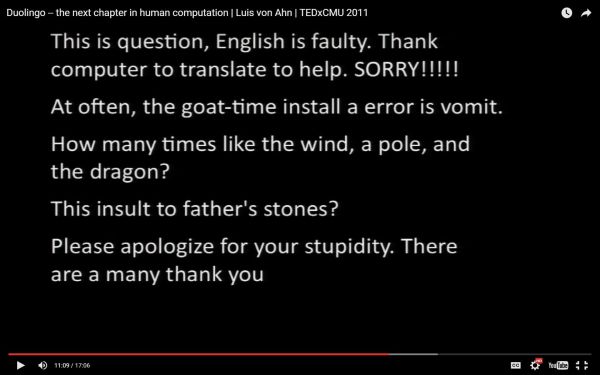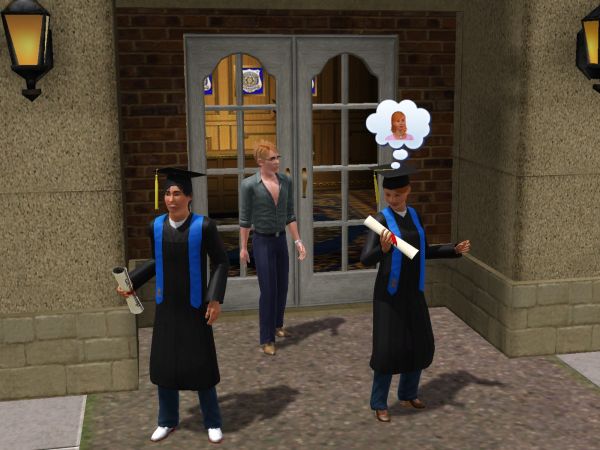
Please apologize for your stupidity! The pitfalls of using machine translation on the Web. Instead, please enlist the French. There are a many thank you.
Back on February 23, 2013, I wrote about Duolingo, a website that let you learn a foreign language by translating the Web. Or that was the idea. I also mentioned that it had relatively few languages, all of which were cousins of English either on the Anglo-Saxon or the Norman side.
Things have changed a little, but Duolingo is still around, and there are now a few more languages. (You can learn Norwegian! So you can properly greet your new overlords when the longships come.) No truly alien ones such as Japanese or Mandarin, but a couple using Cyrillic alphabet, and Hebrew is in the works; there are also western languages for Arabic speakers, so the alphabet problem seems to be worked around. And there’s Turkish for English-speakers. While using a slightly modified Latin alphabet, Turkish is not an Indo-European language, meaning it is not visibly related to English and its neighbors. (Even Russian is much closer to English.)
Naturally I have started learning Turkish. Because I can. Or because I wanted to see whether I can learn a language from scratch, without even a seed of background knowledge. We had a smattering of French in school, so when I play around with French on Duolingo, I am never sure how much I am actually learning and how much comes back to me from our seemingly futile French classes, and how much I have picked up from French pop music and cultural references. None of those are particularly applicable to Turkish, because Vienna did not fall to the Ottoman army in this timeline.
***
Back when Duolingo was new, it had just the website (although it was surprisingly mobile-friendly for a site with so much interaction). Now there are apps for iOS and Android. They are similar to the website, but actually easier. In other words, I take longer completing the standard chunk of 10 XP on the website. This is partly because I downloaded the appropriate languages for my smartphone keyboard (I use SwiftKey, but this probably also works with Google keyboard). The keyboard helpfully corrects badly spelt words, and even proposes valid words if I get the first letters right or nearly right. In addition, the Android app is more likely to give me exercises of the type “tap the word pairs” or “select the words” instead of actual writing exercises.
The focus on translating the web seems to have receded a bit. The philosophy was sound enough: The server keeps track of each student’s competence level, and assigns sentences from actual texts that the company is paid to translate. If the sentence is short and contain only common words, it can be assigned to a newbie, while longer sentences with more advanced vocabulary are reserved for advanced learners. The same sentence is given to a bunch of different students, and if they agree on the translation, fine. If not, you may get to vote on which translation is correct.
The website has a tab called “Immersion” which does take you to the translation work, but you are not pushed into it early in the course at least. I still haven’t actually completed any languages yet (as if such a word even has meaning for a language). I am supposedly 25% fluent in French, although I suspect 2.5% would be a more accurate estimate. I am not entirely sure I can say “twentyfive” in French.
With translation somewhat sidetracked, it seems that the company Duolingo is currently living on investments while waiting for a buyer or IPO to go public. For now it is completely free, and this was important to the founders. But if it gets bought up, it is anybody’s guess how long it will be free. At the very least I would expect a return to focus on actually useful translations. But for now it is mostly fun and games.
***
Duolingo is highly gamified. That is, the learning is made as fun as possible. Completing exercises give you XP (experience points) and you level up by doing enough of them. When you have completed a topic group (like “food”, “clothing” or “animals”) you get “lingots” which is the currency of the game. You can use these in the “lingot store” to unlock optional features like “learn flirting”.
There are small chunks of exercises that normally only take a few minutes, and they are a mix of different types. In the case of French, I translate phrases and sentences from French to English, and from English to French. The French phrases are spoken as well as written. There are also exercises where I listen to a French phrase and write it down in French, and others where I listen and try to repeat a phrase. Sometimes I get to pick a translation of a slightly harder sentence from 3 alternatives in French. Sometimes I get 6 different words, 3 in each language, and get to sort them into pairs.
In the original version, you started with 3 “hearts” which would break if you made a mistake. If you lost all three hearts and made a fourth mistake, you had to redo that batch. But evidently that made people lose heart for real, so this has quietly been dispensed with. Now instead, if you make mistakes, you don’t make progress, or may even be set back a little, but nobody scolds you in any way. It just takes longer to gain your 20 XP (two batches of exercises) for the day.
There is currently a bug where, if you study two languages, Duolingo will count progress on one of them as progress on them both. OK, I am not 100% sure if this is a bug or a feature, but I am almost sure it is a bug, because it does track progress on both of them when I look at the daily reminder mail. But in the app and on the website, I have to keep track myself.
***
Duolingo is probably the most efficient way to get started on a foreign language today. (Science backs this up: A study showed that 34 hours of Duolingo was equal to a semester of beginner Spanish in college.) It may over-estimate your progress (it certainly does with mine), but you can’t avoid noticing when you don’t know something, so it is kind of self-correcting if it pushes you too far ahead too fast. And it is just plain fun to use. Not super fun like actual computer games, but I certainly wish my workday was like this! So more fun than reading the newspaper. (Just kidding, boss! ^_^)
So go get it while it’s free. Remember, being bilingual delays Alzheimer’s. We want to delay Alzheimer’s until someone has found a cure for it, OK? So here you go, now:




